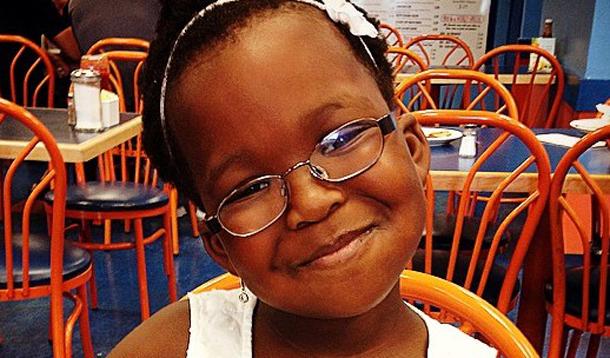
From the moment I first saw them on my computer screen, I fell in love with my daughter's gorgeous eyes. They still melt my heart when they twinkle with impish mirth to make me giggle or show me with a flat stare that I've made a parenting mistake that needs reparation. After adopting her, those eyes became even more of a focal point for me, because eye contact is a good sign that a child is bonding with her adoptive parents.
You would think that with the significance of her eyes to both her and me, their health would have taken higher priority. I have worn glasses since I was twelve, yet it never crossed my mind that my daughter might need to be examined by a Doctor of Optometry.
I had her examined at a young age for everything else — hearing issues, motor skills, speech development — you name it. Yet somehow I never questioned her vision or her eyes, despite the absence of her genetic eye health history — and the fact that even with genetic eye health history, I wouldn’t be able to assess the health of her eyes. She regularly looked me in the eye and smiled, so obviously her vision was just fine, right?
Wrong — sort of.
It was my husband who noticed that she was squinting every time she watched TV. So, at the age of three, we took her to a Doctor of Optometry for an eye exam. I was actually surprised to learn that she was not too young for the exam, because it is recommended that kids have their first eye exams between the ages of six and nine months. For a toddler, a Doctor of Optometry uses pictures of recognizable items instead of letters.
I breathed a sigh of relief when the Doctor of Optometry told me that Baby Girl was not near-sighted or far-sighted, but quickly had the wind sucked out of me when she went on to say that what she did have was fairly severe astigmatism in each eye that would require glasses. I felt awful. Not because she needed glasses, but because I hadn't recognized a problem myself.
However, I'm not alone. In a recent survey, 60% of parents professed that they would know if their child had a vision problem, yet many children with vision concerns show no symptoms. ONE in FOUR school-aged kids have some sort of vision trouble that can ONLY be detected by a proper eye exam. That's TWENTY FIVE PER CENT, people! With 80 percent of a child's learning based on vision, I'm so glad we found out about Baby Girl's need for glasses before she started school. One-in-six children diagnosed with a learning disability really only have a correctable vision problem.
Scary, but only if you do nothing about it.
Thankfully, with her glasses and annual examinations, my daughter no longer suffers any issues with her eyes. Even if your child has had an initial eye exam and had 20/20 vision, here are some other reasons to continue having annual examinations:
If your child is demonstrating any of the following signs and symptoms, then that's an even more important reason to book an eye exam with a Doctor of Optometry as soon as possible:
So what are you waiting for? Given these stats, there really is no excuse to delay taking your children for regular eye exams. Doctors of Optometry provide full-service eye care, including a thorough examination for vision and eye health, the sale and professional fitting of glasses and contact lenses, and even treatment for eye irritations, infections, and disorders.
Your children depend on you to keep them healthy — including their eyes. Don't let them down.
Did you know your child could have problems seeing things clearly and not even know it? Don’t make the mistake of thinking you’ll know if your child has a vision problem.
Visit Doctors of Optometry to find a Doctor of Optometry near you.

This post is brought to you by Doctors of Optometry Canada.
www.doctorsofoptometry.ca
Connect with the Doctors of Optometry Canada on Facebook: https://www.facebook.com/AskaDoctorofOptometry